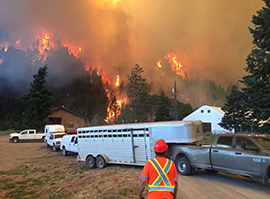CHILLIWACK – BC’s privacy watchdog has rejected a bid to outfit farm workers with body cameras intended to reduce livestock abuse, saying companies need to follow specific protocols before they do so.
An undercover video by Mercy for Animals – the same activist group that used hidden cameras to secure footage of animal abuse at another Chilliwack company, Chilliwack Cattle Sales, in 2014 – led to the termination of several employees at Chilliwack chicken catcher Elite Farm Services Ltd. earlier this year.
The six employees were filmed physically abusing, sexually assaulting and dismembering chickens.
Elite immediately revamped its training program and took steps to make employees more accountable, including outfitting them with body cameras that would document shift activities.
Elite’s efforts caught the attention of acting BC privacy commissioner Drew McArthur. McArthur questioned whether the measures were genuinely addressing employee behaviour or simply a snap response to public outrage over the abuse.
“My office unequivocally condemns all forms of animal abuse,” wrote McArthur in a report released in November. “[But] I was concerned that video surveillance was being used as a ‘quick fix,’ without thoughtful consideration of its potential privacy impacts.”
An investigation was launched, prompting Elite to immediately cease the use of body cameras. Elite
co- operated fully with the investigation, which concluded that specific protocols need to be followed if organizations want to monitor staff activities through body cameras or other forms of surveillance.
Last resort
“Video surveillance should only be used as a last resort, not as a substitute for ineffective recruitment and training protocols,” McArthur said. “[Elite] did not assess the privacy risks associated with implementing video surveillance. In addition, the employees subjected to the surveillance were not the same employees who were responsible for the misconduct; those individuals no longer work for the company.”
The report states that the province’s Personal Information and Privacy Act limits the use of video surveillance to three very specific situations:
• a real and serious threat to personal safety or the security of property;
• the organization has tried all reasonable alternatives without success; and
• there is a reasonable prospect that video surveillance will address those threats.
These conditions were not met in the Elite case, the report argues.
Perhaps the most shocking claim in the report is the assertion that no reasonable person would consider Elite to have suffered an employee management problem.
“A reasonable person would not consider the purposes for the collection to be appropriate in the circumstances,” the report states. “There is insufficient evidence of a safety, security or employee management problem, nor evidence of other significant issues that would authorize the Company to monitor and video record employees, farmers and other contractors going about their normal duties.”
With respect to its its own staff, and notwithstanding the lack of problems managing its workers, the report states that Elite failed to obtain the consent of its employees to the use of the body cameras.
“The company does not have any privacy policies in place that state the purpose for surveillance. It did not notify its employees and non- employees subject to surveillance that it would be collecting their personal information. Finally, it did not conduct a privacy impact assessment,” the report says.
The report makes no reference to the appropriateness of Mercy for Animals’ use of hidden video cameras to film and expose the abuse by Elite’s workers. Elite president Dwayne Dueck did not respond to a request for comment by deadline.
BC SPCA lobbies for cameras
However, the report complicates recent calls by the BC SPCA, which polices animal cruelty on behalf of the province, for cameras to be installed in all facilities raising, handling or processing livestock.
“Cameras will give assurance to Canadian citizens that animals raised in intensive farming systems are, at minimum, receiving the basic care required in the national Codes of Practice,” the BC SPCA said in urging support for a petition calling for the measure. “England and France have already passed laws to require all slaughter plants to have cameras, so let’s make Canada next.”
While the privacy commissioner may not feel “a real and serious threat exists” to the property of farmers – in this case, livestock – Shawn Eccles, senior manager, cruelty investigations with the BC SPCA, disagrees.
“I can see where there would be some privacy issues … but there is a concern from our perspective with respect to animal welfare and the need for monitoring,” he said. “There are auditing systems that are out there currently where video cameras are used, and I don’t think there’s a reasonable expectation of privacy if you, as an employee of a contractor, are aware that there are cameras going to be in those barns and the purpose of those cameras is to ensure that animal welfare standards are being met.”
The ruling also hits close to home because the BC SPCA is itself considering adopting body cameras.
“We’re just now exploring the potential use of body cameras for our constables that are out in the field investigating cases of abuse and neglect,” he said.
Mercy for Animals, for its part, responded to McArthur’s report with a call not just for surveillance cameras but live, streaming video so that it is accountable to the third party and the public.
“Mercy For Animals is calling on Commissioner McArthur to allow video recording inside farms and slaughterhouses in order to prevent egregious animal cruelty,” the organization said in a statement. “Further, Mercy For Animals is urging Elite Services not just to equip workers with body cameras but to live- stream to the Internet and/or to a third- party auditing firm.”


 Producers take concerns to Victoria
Producers take concerns to Victoria